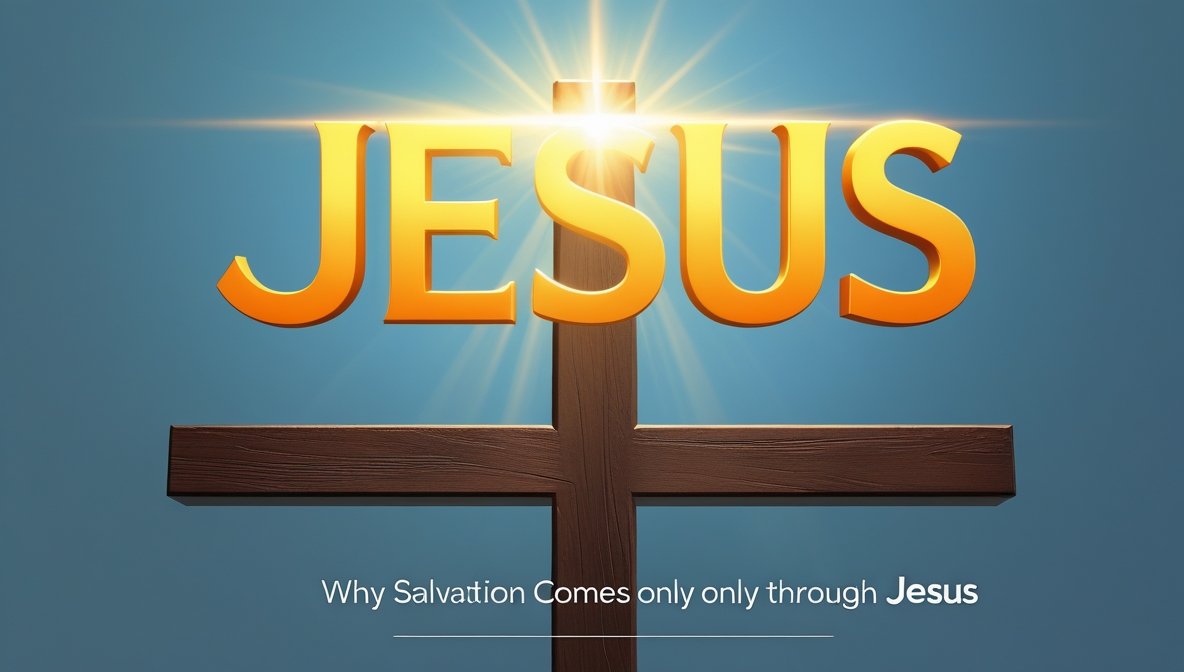No Other Name: Why Salvation Comes Only Through Jesus
You may have heard the phrase “No other name” many times in church or from friends who follow Jesus, but what does it mean for you today? This phrase captures a bold claim found in Scripture and carried by Christians through the centuries: that salvation — real, lasting rescue from sin and death — is found only in Jesus. This article will walk with you through the biblical basis for that claim, especially Acts 4:12, and gently explain why the uniqueness of Christ matters for your life. Throughout, you’ll see how the message of Salvation through Jesus is not merely theological jargon but a life-changing truth meant for you.
The Clear Claim of Acts 4:12
When you read the early church’s testimony, you meet a sentence so plain and powerful that it leaves little room for ambiguity. Peter declared, “Salvation is found in no one else, for there is no other name under heaven given to mankind by which we must be saved” — a statement recorded in Acts. The apostle’s words confront you with a simple truth: Jesus alone is the authorized Savior. Read the passage as it appears in the Bible: Acts 4:12. Acts 4:12 ties Salvation through Jesus to the identity of Jesus himself — not to general goodness, not to religious effort, but to the person and name of Christ.
The Problem You Face: Sin and Separation
To grasp why Salvation through Jesus is necessary, you first have to recognize the problem. The Bible tells you plainly that “all have sinned and fall short of the glory of God” — a universal condition that affects every human heart: Romans 3:23. Sin is more than broken behavior; it’s a spiritual reality that separates you from the holiness of God, leaving a gulf between your soul and your Creator. Isaiah explains this separation plainly: your sins can cause a barrier between you and God Isaiah 59:2. If left unaddressed, that separation leads to spiritual death. When you understand your need, the urgency and kindness of Salvation through Jesus becomes clearer.
Why Alternatives Fail
You may be tempted to think that all paths lead to God, or that good works, ceremonies, or sincere intentions are enough. Yet the Bible insists that Christ’s work is unique. Jesus said, “I am the way and the truth and the life. No one comes to the Father except through me”: John 14:6. That statement doesn’t express narrowness in a harmful sense; rather, it offers clarity about how God has chosen to bring people back to himself. The apostle Paul emphasizes this uniqueness, showing that God has provided one means by which sinful people can be reconciled to Him. You can trust that Salvation through Jesus is not exclusion for arbitrary reasons, but the fulfillment of God’s purposeful plan to rescue you.
The Uniqueness of Christ’s Work
What makes Jesus uniquely qualified to save you? The New Testament points to several distinctive truths: his perfect life, his substitutionary death, and his resurrection. The world offers many moral teachers and inspiring leaders, but none can claim both full deity and full humanity, living a sinless life and then willingly paying the penalty for others. Scripture tells you that the wages of sin is death, but the gift of God is eternal life in Christ Jesus: Romans 6:23. Salvation through Jesus is unique because only he could bridge the gap your sin created — only he could satisfy the demands of God’s justice and demonstrate God’s love at the same time.
Salvation as Gift, Not Achievement
It’s important for your heart to grasp that salvation is not something you earn by trying harder or checking off religious duties. The Bible describes salvation as a gift that God gives through faith: “For it is by grace you have been saved, through faith—and this is not from yourselves, it is the gift of God—not by works, so that no one can boast”: Ephesians 2:8-9. Salvation through Jesus comes to you when you receive God’s grace, not when you attempt to buy it with your efforts. This truth should free you: your standing before God is not determined by your performance but by the finished work of Christ. When you accept that gift, your life begins to be shaped by gratitude rather than guilt-driven striving.
The Heart of the Gospel: God’s Love Displayed
At the center of Salvation through Jesus is God’s love reaching out to you. The familiar verse many of us learned early captures this plainly: “For God so loved the world that he gave his one and only Son, that whoever believes in him shall not perish but have eternal life”: John 3:16. That love is not sentimental; it’s sacrificial. God’s remedy for your separation was costly. Jesus bore the penalty you deserved so that you might receive the life you could never produce for yourself. When you grasp this, the Christian message becomes personal and transformative: Salvation through Jesus is God’s loving act to restore you into a relationship with Himself.
The Historical and Personal Reality of Jesus
Salvation through Jesus is not a vague spiritual idea; it rests upon real historical events. The apostle Paul stressed how the gospel he preached was anchored in history: Christ died for our sins, was buried, and was raised on the third day in accordance with the Scriptures: 1 Corinthians 15:3-4. The resurrection validates Jesus’ claims and secures your hope. It assures you that Jesus truly conquered death and offers you new life. When you put your trust in him, you’re not trusting a myth but a person who lived, died, and rose—events witnessed, proclaimed, and recorded to give you confidence that Salvation through Jesus rests on historical reality.

How Salvation through Jesus Changes Your Life
When you experience Salvation through Jesus, change begins to permeate every area of your life. It’s a transformation that starts within and radiates outward: your desires shift, your priorities realign, and your relationships begin to reflect grace. Scripture calls this process sanctification, the ongoing work of God shaping you to be more like Jesus. You will still struggle and stumble, but the direction of your life changes. Instead of being bound by guilt or aimless striving, you find purpose and strength. Salvation through Jesus gives you a new identity — you become a child of God — and that identity infuses your daily living with hope and meaning.
What It Means to Trust Christ
Trusting Christ is more than intellectual agreement; it’s turning from reliance on yourself and trusting in Jesus alone for forgiveness and new life. The Bible puts it plainly: “If you declare with your mouth, ‘Jesus is Lord,’ and believe in your heart that God raised him from the dead, you will be saved”: Romans 10:9-10. This passage shows that your response involves both belief and confession — an inward trust that springs into outward expression. Salvation through Jesus is received when you repent (turn away from sin) and place your faith in Christ. That moment is the beginning of a lifelong journey of following him, growing in faith, and participating in the life of his church.
Assurance of Salvation
You might wonder whether you can be certain of your salvation. The Bible offers assurance so you don’t live in fear or constant uncertainty. Jesus promises that his sheep listen to his voice, follow him, and they will never perish: John 10:27-29. Paul amplifies this assurance by affirming nothing can separate you from the love of God in Christ Jesus: Romans 8:38-39. When you’ve truly trusted Jesus, you have a confidence anchored in God’s faithful promises, not in your fluctuating feelings. Salvation through Jesus includes the gift of assurance — a settled peace that God holds you securely.
Evangelism and the Urgency of the Message
The exclusivity of Salvation through Jesus carries urgency for how you live and speak. It’s not a message of condemnation to fling at people; it’s a lifeline offered in love. Acts records the early church’s uncompromising commitment to declaring Christ as Savior: Acts 4:12. That boldness sprang from gratitude and conviction — a conviction that the world’s deepest need is to be reconciled to God. If you believe Salvation through Jesus is true, then sharing it becomes an act of mercy. You will want to tell others because you care for their eternal welfare and hope they, too, will experience the forgiveness and new life that you’ve known.
Common Questions and Objections
You may have honest questions: Is it fair for God to require faith in one person? How does God’s love fit with the exclusivity of Christ? The biblical answer is that God has revealed himself through Jesus in a way that makes the path to restoration clear. Isaiah reaches out to those who are lost, inviting them to look to the Lord and be saved: Isaiah 45:22. God’s justice and mercy meet at the cross. The exclusivity of Salvation through Jesus does not reflect arbitrary divine caprice; it reflects God’s chosen, gracious, and sufficient provision for sinful people. These truths call for humility and compassion, not arrogance, as you engage with others who hold different beliefs.
The Role of Repentance and Faith
Salvation through Jesus invites a response of repentance and faith, both of which flow from God’s grace working in your heart. Repentance means a sincere turning away from sin and turning toward God; faith means trusting Jesus for forgiveness and life. Together, they are the doorway into a restored relationship with God. The New Testament repeatedly links repentance and faith to salvation, showing that God’s grace changes not just your legal standing but your heart and actions. When you repent and place your trust in Christ, you step into the abundant life Jesus promised, and you begin to experience the implications of Salvation through Jesus in day-to-day living.
Living Out the Salvation You’ve Received
Once you’ve experienced Salvation through Jesus, your life should show the evidence of that change. The early church devoted itself to teaching, fellowship, breaking of bread, and prayer. Those practices weren’t religious formalities but life-giving rhythms that helped believers grow: Acts 2 describes the early gathering of believers and their shared life (see Acts 2:42-47). Living out salvation involves regular Bible reading, prayer, repentance, baptism, and participation in a local community of believers. These are not ways to earn salvation but means by which God sustains and matures the new life he’s given you. Salvation through Jesus is meant to be lived in community, where encouragement, accountability, and service flourish.
The Cost and the Joy of Following Jesus
Following Jesus is not always easy; the path of discipleship can involve sacrifice and suffering. Yet the Bible also promises that the joy of following Christ outweighs the cost. Jesus warned that his followers would face trials, but he also promised his presence and ultimate reward. The Christian life is marked by both challenge and deep, sustaining joy that comes from knowing and serving Christ. Salvation through Jesus changes your perspective about suffering and loss because you see them in light of God’s ultimate purposes. The cross calls you to self-denial, but it also opens you to a joy that transcends circumstances.
Faith That Acts: Good Works and New Priorities
While Salvation through Jesus is by grace through faith, genuine faith results in good works — not as a way to earn salvation, but as its fruit. James captures this dynamic when he writes that faith without works is dead: true faith expresses itself in love and obedience. As you grow in Christ, your priorities will shift: compassion for the poor, honesty, generosity, and a compassionate heart toward others become marks of your faith. These are not legalistic requirements; they are the natural outflow of a heart touched by grace. When you live in this way, you bear witness to the transforming power of Salvation through Jesus.
The Global and Eternal Scope of Salvation
Salvation through Jesus has global and eternal significance. The gospel is for every tribe, language, and nation — it is meant to be proclaimed to the ends of the earth, reflecting God’s heart for all people. Revelation and the New Testament vision of the kingdom point to a restored creation where God’s people worship him forever. Knowing this, your faith participates in a grand story that extends beyond your life and local community. You’re invited into a movement that seeks the redemption of individuals and the renewal of all things through the work of Christ.
A Personal Invitation
If you’ve been reading and your heart has been stirred, let me speak plainly to you now. Salvation through Jesus is offered to you today. The invitation is simple: turn from your reliance on yourself and trust Jesus as your Lord and Savior. If you confess his Lordship and believe in your heart that God raised him from the dead, you will be saved: Romans 10:9-10. This is not a ritual to perform out of habit; it’s a life-altering decision to place your hope in the person of Jesus. If you take that step, you will find forgiveness, a new direction, and the presence of God with you always.
What to Do Next
If you decide to trust Christ, consider these simple, biblical steps: repent of your sins, confess Jesus as Lord, believe in his resurrection, and connect with other believers who can help you grow. Baptism is an important public testimony of that inward change. Surround yourself with Scripture and prayer, and join a local church where you can be nourished and serve. Salvation through Jesus begins with a personal decision, but it is sustained in community and by the means of grace God has provided.
Conclusion: No Other Name
You’ve been invited into the most significant relationship possible — a restored relationship with your Creator through Jesus Christ. The Bible’s claim is astonishingly simple and wonderfully good: no other name can save you; only Jesus can offer the reconciliation you need. Acts 4:12 cuts to the heart of the matter: Acts 4:12. This is not a message intended to exclude; it is a message intended to rescue. If you respond in faith, you will not only receive forgiveness but also new life, purpose, and an eternal hope. Salvation through Jesus is the most loving and powerful offer you will ever receive — an offer that changes everything.
Explore More
For further reading and encouragement, check out these posts:
👉 7 Bible Verses About Faith in Hard Times
👉 Job’s Faith: What We Can Learn From His Trials
👉 How To Trust God When Everything Falls Apart
👉 Why God Allows Suffering – A Biblical Perspective
👉 Faith Over Fear: How To Stand Strong In Uncertain Seasons
👉 How To Encourage Someone Struggling With Their Faith
👉 5 Prayers for Strength When You’re Feeling Weak

📘 Jesus and the Woman Caught in Adultery – Grace and Mercy Over Judgement
A powerful retelling of John 8:1-11. This book brings to life the depth of forgiveness, mercy, and God’s unwavering love.
👉 Check it now on Amazon
As a ClickBank & Amazon Affiliate, I earn from qualifying purchases.
Acknowledgment: All Bible verses referenced in this article were accessed via Bible Gateway (or Bible Hub).
“Want to explore more? Check out our latest post on Why Jesus? and discover the life-changing truth of the Gospel!”






